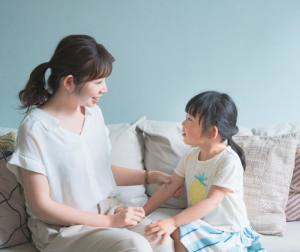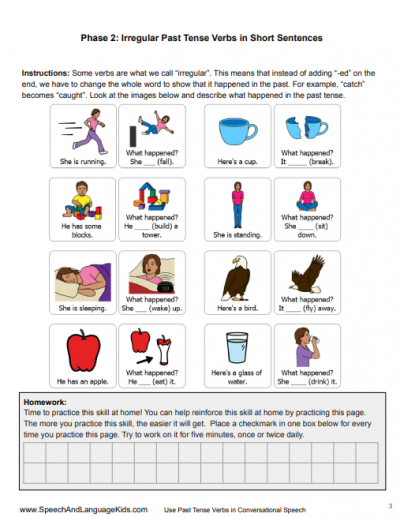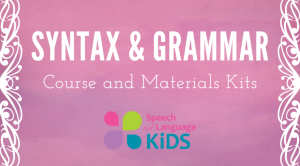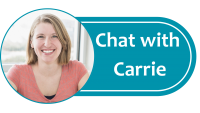
4-Year-Old Speech Checklist: Milestones for Speech and Language
This page is all about 4 year old speech and language skills. Keep in mind that these milestones are based on research about typically-developing children but this information is not meant to diagnose a speech-language delay or disorder. There is a wide range of “normal” and even if your child is slightly delayed in a few of these areas, it doesn’t necessarily mean he or she has a speech or language delay. Please contact a speech-language pathologist for a screening if you are concerned about your child’s speech and language skills.
4-Year-Old Speech Checklist (Sound Production)
4-year-old speech milestones refer specifically to the sounds that a child is able to speak. We use the term “speech” to refer to how a child pronounces words, whereas “language” is used to describe how children use those words to create sentences and communicate with those around them.
- Intelligibility: A 4-year-old’s speech should be understood about 75% of the time (source: Hustad et. al, 2021)
- Speech Sounds Correct: A 4-year-old should be able to say the following sounds correctly: /b/, /n/, /m/, /p/, /h/, /w/, /d/, /ɡ/, /k/, /f/, /t/, “ng”, and “y” (source: Crowe & McLeod, 2020)
- Phonological Processes: A 4-year-old should no longer be using the following speech error patterns (phonological processes):
- Velar Assimilation: Changing non-velar sounds to velar sounds in order to mirror another sound in the word (kack for tack, or guck for duck)
- Nasal Assimilation: Changing non-nasal sounds to nasal sounds in order to mirror another nasal sound in the word (money for funny, or nunny for bunny)
- Stopping of /f/, /s/, /z/, and /v/ Fricatives: Replacing /f/, /s/, /z/, /v/ sounds with a stop (short) sound like /t/, /d/, /b/, /p/ (pun for fun, or tee for see)
- Final Consonant Deletion: Deleting the ending consonant off of a word (bu for bus, or no for nose)
- Fronting: Velar sounds (back sounds like /k/ and /g/) are replaced with alveolar sounds (front sounds like /t/ and /d/)
- Deaffrication: Affricate sounds (“ch”, “j”) replaced with fricatives (“sh” and “zh”)
- Cluster Reduction without /s/: Consonant clusters reduced to a single consonant (“keen” for “clean” or “tin” for “twin”)
- Weak Syllable Deletion: Reducing multi-syllabic words by omitting a syllable (“brella” for “umbrella”)
- Source: ASHA Resource Page
4-Year-Old Language Checklist
4-year-old language milestones refer to how the child is able to put words together to communicate with those around them. A lot goes into language skills. Here is a list of 4-year-old language milestones:
- Sentence Length: A 4-year-old should be speaking in sentences that are, on average, about 4 words long. Some should be sentences and some should be a bit longer than 4 words as well. (Source: Rice et. al., 2010)
- Grammatical Markers: Grammatical markers are the little words and word endings that help make our sentences complete and convey nuances of meaning. A 4-year-old should be using most grammatical markers correctly, although they may still have trouble with some of the later-developing grammatical markers such as the “to be” verb (like “I’m”, “we’re”, and “she is”) and irregular 3rd person singular forms. (Source: Paul & Alforde, 1993)
.- Here are a list of the grammatical markers that a child should be able to use correctly most of the time when they are 4 years old: present progressive “-ing”, plural nouns, “in” and “on”, possessives, past tense verbs, and 3rd person singular verbs (like “he sings”), and pronouns.
. - Click here to view all of our resources for teaching grammar skills
.
- Here are a list of the grammatical markers that a child should be able to use correctly most of the time when they are 4 years old: present progressive “-ing”, plural nouns, “in” and “on”, possessives, past tense verbs, and 3rd person singular verbs (like “he sings”), and pronouns.
- Questions: Children at 4 years old should be able to ask and answer some questions, if not all question types. Here are some specific recommendations for question skills for 4 year olds:
- Should be able to answer simple questions like “what is a coat for” and “what is a crayon for” (Source: CDC)
- Should be able to answer simple “who”, “what”, and “where” questions (Source: ASHA)
- Should be able to ask “why”, “when”, and “how” questions (Source: ASHA)
.
Click Here to View our Resources on Teaching Children to Ask and Answer Questions
.
- Vocabulary: A 4-year-old should know a lot of words by now and they should be learning new words all of the time. This is a time of great vocabulary growth for children. Repeated exposures to new words can help grow a child’s vocabulary skills at this age. Here are a few milestones for vocabulary at this age:
- Should understand some color words (like, “red”, “blue”, and “green”) (Source: ASHA)
- Should understand words for some shapes (like, “circle” and “square”) (Source: ASHA)
- Should understand words for family (like, “brother” and “grandma”) (Source: ASHA)
.
Click Here to View our Resources on Increasing Vocabulary
.
- Following Directions: A 4-year-old should be able to follow basic 2-step directions and should be beginning to follow some 3-step directions, especially if they are familiar or part of their normal routine. A 4-year-old may still require repetitions or reminders to stay on task, especially if the direction is unfamiliar to them. They should also be able to respond when you call them from another room. (Source: ASHA)
.
Click Here to View our Resources on Helping Children Learn to Follow Directions
. - Literacy: Children at 4 years old should begin to show an interest in books. Reading with a 4-year-old is one of the best ways to boost language skills! At this age, children should have the following literacy skills:
- Says some words from a song, story, or nursery rhyme (Source: CDC)
- Tells what comes next in a well-known story (Source: CDC)
- Says rhyming words like “hat-cat” (Source: ASHA)
.
Click Here to See our Resources on Teaching Pre-Reading Skills to Preschoolers
4-Year-Old Social Skill/Interaction Checklist
Another aspect of 4-year-old language milestones is how well they can interact with others. Here are some milestones related to social skills and interaction.
A 4-year-old should be able to:
- Pretend to be something else during play (teacher, superhero, dog, etc.) (Source: CDC)
- Ask to go play with children if none are around, like “Can I go play with Alex?” (Source: CDC)
- Comfort others who are hurt or sad, like hugging a crying friend (Source: CDC)
- Avoids danger, like not jumping from tall heights at the playground (Source: CDC)
- Changes behavior based on where she is (library vs. playground) (Source: CDC)
- Talks about at least one thing that happened during her day (Source: CDC)
- Engages in longer dialogues and anticipates next turn at talking (Source: ASHA)
- Makes conversational repairs when not understood and corrects others (Source: ASHA)
For more resources on teaching social skills to children, click here.
Activities and Ideas for Boosting Language Skills in Children:
If you are looking for therapy ideas or home activities to boost a child’s language skills, check out our eBook with lesson plans and activities for teaching 39 different speech and language skills. Or, check out our course on helping children with syntax and grammar.

About the Author: Carrie Clark, MA CCC-SLP
Hi, I’m Carrie! I’m a speech-language pathologist from Columbia, Missouri, USA. I’ve worked with children and teenagers of all ages in schools, preschools, and even my own private practice. I love digging through the research on speech and language topics and breaking it down into step-by-step plans for my followers.
Fun Fact: I used to love playing cello in the pit orchestra for our high school musicals. One year, they did School House Rock and they needed a cellist up on stage for the “Figure 8” song and I was it! I dressed in groovy bell bottoms and played cello while someone figure skated in figure 8s around me. It was an odd experience!
Connect with Me:










Hi there.
Thank you for the article. My 4 year old uses “her” instead of “she”….interestingly, she does use “he”. Is this normal and is there a way to teach her to use he proper pronoun besides example?
Thank you. Susan
That’s very normal! All of those pronouns are confusing to get straight. Most of the time when correcting that type of error, I will just repeat what the child said back the correct way with an emphasis on the corrected word. For example, I might say “yes, SHE went to the store”. Hopefully, once your daughter hears this enough she will start to understand the pattern. If the child I’m working with doesn’t pick up on it from that, I will have them practice repeating it back to me and practice a little more intentionally.
My son has pretty much all this down, he is very smart but has a problem with saying ‘ me ‘ instead of ‘ I ‘ how do I help him overcome this?
Try telling him what language he can say instead. For example, if he says “me want that”, your script is “you can say, ‘I want that'”. Exaggerate the “I” when you say it. You can also play games where he needs to say an “I” sentence for each turn he takes. For example, if you’re playing candyland, have him say “I got green” or “I got blue” for each turn. Just keep working on it and you’ll get it. Good luck!
My daughter will be turning 4 in two
Months. She talks everything but make some mistake like instead of he she says she and instead of him she says her. And few more grammatical mistakes sometimes not always. But my biggest concern is she is still not able to explain the story pharases by Pharases or sequences of the details of incident . So I just want to know is it a concern.
Hello! I can’t tell you what’s going on with your child since I haven’t worked with her directly. If you’re concerned, I suggest seeking help from a speech-language pathologist in your area or your child’s doctor.
Thank you for the helpful article, I actually needed to see this in black and white to know my child is fitting into the “norm” category (a terrible term of expression in my opinion).
I had him assessed recently and what a lot of people fail to realise is Covid unfortunately had a lot to do with his speech and language development. He is not speaking as freely as the non Covid 4year old would but he was so isolated and only had myself for company.. While I had the best time unfortunately this did not stimulate him socially so he is still catching up and I’m very sure that there are other 4years olds in the same situation.
Thanks again, great article x x
Just curious, how much information can you tell a 4 year old at a time, before they are just not following what you are saying? Ex. We are going to (store), and you will stay in the truck with (parent). I will be gone 5 minutes.
Should a typical 4 year old be able to follow all of that? I’m never certain whether or not my child is?
Hi. My son is already 4 years old and he hasn’t speak yet. What’s the best way to do?
Hi, Ar-
We are not able to make a diagnosis for your son. But, you may want to get in touch with this doctor to see what he/she recommends. Also, you can check this post out from Carrie.
My Grandson is turning 4 in 2 months, he has had a Speech Therapist for about 2 yrs now. My concern with his Therapist is that she is to playful with him my Grandson she’s her as a friend and has not learned much. I myself help him with flash cards he has learned his letters numbers and has learned to say short sentences. I hear his Therapist wanting to do occupational Therapy but I don’t think that’s needed. How else can I help my Grandson if the Therapist is not helping.
Hi, Diana-
I am sorry you are having these concerns about your grandson. Unfortunately, we cannot make a diagnosis about the specific needs of your grandson. However, you may want to your grandson’s doctor to see what types of recommendations they could make.
My son just turned 4 last month.He has trouble with the /l/ /sp/ /sl/ sounds. Instead of love he will say “wuv” .. Instead of spider he will say “fider”. Also, instead of slide he will say “fide”.
Is this normal or should I enroll him in speech therapy. He is understood by strangers about 85-90% of the time.
hi, my son is exactly the same he is 4 next week he cannot say R or L so the l is replaced with F Fider instead of spider etc, and the R sound is W. his brother I called Riley to which he calls him Wiley. is this normal? or would speech therapy be recommended?
my grandson will be 4 in September. he is still hard to understand most of the time. if you ask him what is your name he will repeat the word name. he doesn’t seen to understand questions.
Hi, Cindy-
Here is a link to a resource page for what types of speech and language skills a 4 yr old should be able to master. If you need additional help, please email us at speechandlanguagekids.com.
Hello. Thanks for the very informative article! When do you children learn how to form the “th”? sound? My 4 yo cannot yet do it. Thank you!
Hi, Beth-
Here is a link to a resource that shows speech and language skills for 4 yr olds. Also, I found this article about how to teach language sounds to children that may help.
My son has difficulties with pronouncing L words. . He will pronounce ‘La’ as “wah”. I try to get him to mimic me by saying LA LA LA LA. But he seems to have difficulties. Any suggestions.
Hi, Robyn-You can check out this link on Carrie’s site for some possible suggestions to help your son: https://www.speechandlanguagekids.com/?s=%2Fl%2F. Please let us know if you need anything further.
Iam so happy that I found your web site! Thank you for sharing all this information. I feel I now have a plan that is going to help my grandson.
You are more than welcome, Patty! Please let us know if you have any questions that we can help answer regarding your grandson.
My daughter will turn 4 in 2 months. She has a very hard time saying the r, l d, and g sounds. Because of this its very very hard for even me to understand what shes saying much of the time. With every other skill mentioned here she is on target and is very expressive. I mean she has a lot to say but so hard to understand. Is this normal? Can i expect these errors in speech to resolve on thier own?
Hello! Thank you so much for reaching out. Unfortunately, we get a ton of questions every day about how to solve specific speech/language problems. Since we have such a small staff, we aren’t able to answer every question that comes through on the website, social media, or via email. If you are a parent, we suggest you reach out to a local speech-language pathologist who can work with your child directly and answer your question.
If you are another speech-language professional, we have created a membership where we pay a full staff to answer questions like this on a regular basis. We would be more than happy to answer your question inside the membership program. We’re able to answer more questions in here because we have a full library of questions that we’ve already answered so our staff can either link you to the answer if it exists, or write you a custom response if needed. We’d love to see you inside the membership!
Click Here to Become a Member: https://www.slpsolution.com/pediatric-signup/.
This website is so helpful! Thankyou for this!
I have a 4 year old who says all words, sounds everything but only says them in 2 words like “want car” and not the complete sentences.
I am really worried why isn’t he progressing towards sentences when he knows all the words.
Any help on this?
Hi! Here is a link to Carrie’s resources on Sentences: https://www.speechandlanguagekids.com/?s=sentence.
My 4 years old can not pronounce the letter K
Hi, Marlen-I did a quick search on Carrie’s site for /k/. Here is a link that may help: https://www.speechandlanguagekids.com/?s=%2Fk%2F.
Please let me us know if you need anything else.
Can someone tell me what level 3 scale of speech and language report means ?
Hi do you have advice on stuttering? My 4 year old is doing it for a long time now and his doctor suggested looking into a speech therapy. Thanks
Hi, Cherrie- Here is a link to Carrie’s resources on stuttering: https://www.speechandlanguagekids.com/?s=stuttering. Please let us know if you need anything further.
My four year old has difficulty understanding the concept of me and you if I say do you want to do it or me he will say you do it referring to himself how can I help him with this?
Hi, Megan-
Hello, __________________!
Thank you so much for reaching out. Unfortunately, we get a ton of questions every day about how to solve specific speech/language problems. Since we have such a small staff, we aren’t able to answer every question that comes through on the website, social media, or via email. If you are a parent, we suggest you reach out to a local speech-language pathologist who can work with your child directly and answer your question.
If you are another speech-language professional, we have created a membership where we pay a full staff to answer questions like this on a regular basis. We would be more than happy to answer your question inside the membership program. We’re able to answer more questions in here because we have a full library of questions that we’ve already answered so our staff can either link you to the answer if it exists, or write you a custom response if needed. We’d love to see you inside the membership!
Click Here to Become a Member: https://www.slpsolution.com/#memberships
My son is 4 years and 4 months he can’t pronounce the ‘f’ sound he replaces it with ‘d’. His name is Freddie and when he is asked what his name is he says ‘deddie’. He gets very frustrated when people can’t understand him but he says a lot of words and long sentences its just the f or th sounds he struggles with, please help!
Hi, Louise-I did a quick search on our website and found the following link for /f/ sounds: https://www.speechandlanguagekids.com/?s=%2Ff%2F
Please let us know if you need anything further.
Hi, we are Romanians but we live in UK. Our daughter is 4 years old and she has started nursery in September, we speak Romanian at home. She is learning English from the nursery, her vocabulary has improved, she changes very fast from one language to another, but somwtimes we cannot understand what she is saying like she doesn’t articulate the words or for example instead of Filip (Philip) she says Tilip and lately she has developed a new “ch” accent, for example today she pronounced the word fairy “chairy”. Should i be worried or is just because she has to learn 2 languages?
Hey there! Since I haven’t met your daughter directly, I can’t say specifically if there is a problem or not for her. But I can tell you that we don’t normally work on the “ch” sound until 5 or 6 years of age because a lot of children are still struggling with it at that age. We do sometimes work on the /f/ sound at 4, but it will depend on the child. There is more information here:
https://www.speechandlanguagekids.com/how-to-teach-a-new-sound/
But if you are concerned, you should talk to your child’s doctor!